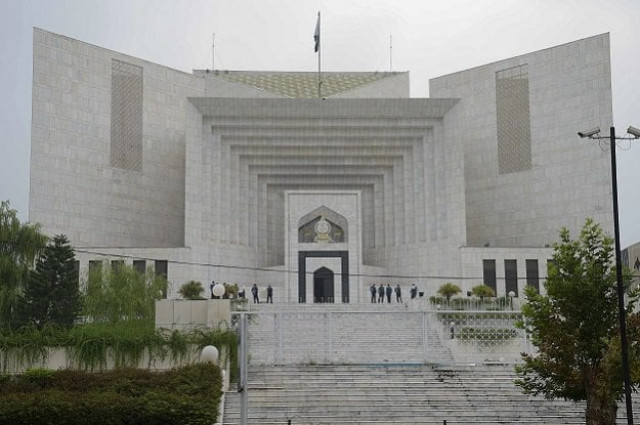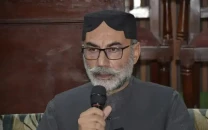‘Allowing disqualified person become lawmaker a failure to protect Constitution’
Writes Justice Sheikh Azmat Saeed while authoring detailed judgment on disqualification of PTI MPA Abdul Munim

Justice Sheikh Azmat Saeed said while authoring detailed judgment on disqualification of PTI MPA Abdul Munim PHOTO: AFP/FILE
“Even where a matter comes before this Court regarding the qualification or disqualification of a Member of the Majlis-e-Shoora or the Provincial Assemblies otherwise by way of proceedings other than under Article 184(3) of the Constitution, this Court not only has the jurisdiction to convert such proceedings to proceedings under Article 184(3) of the Constitution but is bound to do so, as to permit an unqualified or disqualified person to continue to defile and desecrate the Majlis-eShoora or the Provincial Assemblies and masqulate as a chosen representative of the people would amount to frustrating the Constitutional provisions.
"In such an eventuality, if this Court looks other way, it would perhaps constitute a failure to protect and preserve the Constitution,” said Justice Sheikh Azmat Saeed while authoring the detailed judgment regarding the disqualification of PTI MPA Abdul Munim on Friday.
The other two members of the three-judge bench were Justice Mushir Alam and Justice Mian Mazhar Alam Khan Miankhel.
The bench had floated a question that whether a person, who is either not qualified or disqualified under the Constitution and the law from being a member of parliament or a provincial assembly sneaks into such House, would this be considered infringement of constitutional right of the people of Pakistan?
"Our Constitutional dispensation is erected upon the democratic principle that the authority vest with the people of Pakistan can only be exercised through their chosen representatives. Such authority, including the power of law making and control over the public exchequer is to be conferred upon the chosen representatives by way of trust and the trust can only be reposed upon those who are worthy thereof."
The judgment says that if no objection is raised or challenge thrown or relevant proceedings initiated before the appropriate forum at the appropriate time, the disqualification of a candidate is not cured nor an abscent qualification acquired.
Hours before Senate polls: PTI loses a vote in K-P
"There can be no escape from the fact that if a person suffering from a pre-election disqualification or lack of qualification slips through the cracks and no objection is raised before the Returning Officer, no complaint is made to the ECP in terms of Section 103AA of ROPA of 1976 within the time specified therefor and no Election Petition filed before the learned Election Tribunal then the inherent disqualification of such person is obviously not cured nor can it be said that by mere absence of a challenge he acquires the qualification by lapse of time."
In such circumstances, the court says that where unqualified or disqualified person manages to escape through the net and trespass into the Majlis-e-Shoora or the Provincial Assembly, the Constitutional jurisdiction of the learned High Court under Article 199 of the Constitution and of this Court under Article 184(3) of the Constitution can always be invoked.
"where a disqualified or unqualified person slips through the cracks sneaks into the Majlis-e-Shoora or the Provincial Assemblies, his presence in the said House can always be challenged through exercise of the Constitutional CP.3131/2017 31 jurisdiction of this Court under Article 184(3) of the Constitution and before the learned High Court under Article 199 of the Constitution by way of a Writ in the nature of quo warranto"
The bench finds itself unable to decline the prayer of the Petitioner to examine the merits of the case so as to determine on the basis of the material CP.3131/2017 32 available on record whether Respondent No.1 was qualified or disqualified from being a Member of the Provincial Assembly, KPK.
"Any refusal on our part to avoid or evade such an exercise would constitutes a departure from the law as laid down by this Court and perhaps would even amount to a betrayal of the Constitution. Hence, we convert these proceedings into Suo Motu proceedings under Article 184(3) of the Constitution."
The court held that Abdul Munim was not qualified to be and disqualified from being a Member of the Provincial Assembly of KPK at all material times, hence, was liable to be de-notified as such by the ECP. Furthermore, he was obliged to return all the benefits i.e. salary and other allowances received by him as a Member of the Provincial Assembly and also criminal proceedings as provided under the law are also directed to be taken against him.
Therefore, the impugned judgment of the learned High Court dated 15.08.2017 needs to be set aside and the Order of de-notification issued by the ECP revived.
"In the circumstances, a period of two years had not lapsed on 31.03.2013 the date of resignation. When he contested the elections held on May, 2013 and submitted his Nomination Papers, therefore, he was disqualified in terms of Article 63(1)(k) of the Constitution and further having deliberately concealed material facts in his Nomination Papers by failing to disclose that he was in fact disqualified under Section 63(1)(k) of the Constitution and being a ghost employee he can hardly be considered to be honest in terms of Article 63(1)(f) of the Constitution, hence, was not qualified in view of the aforesaid provisions of law."



















COMMENTS
Comments are moderated and generally will be posted if they are on-topic and not abusive.
For more information, please see our Comments FAQ